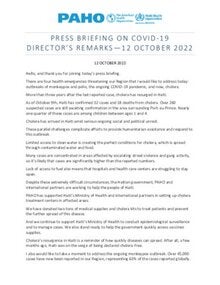Press Briefing on COVID-19: Director's Remarks, October 12, 2022

|
Hello, and thank you for joining today’s press briefing. There are four health emergencies threatening our Region that I would like to address today: outbreaks of monkeypox and polio, the ongoing COVID-19 pandemic, and now, cholera. More than three years after the last reported case, cholera has resurged in Haiti. As of October 9th, Haiti has confirmed 32 cases and 18 deaths from cholera. Over 260 suspected cases are still awaiting confirmation in the area surrounding Port-au-Prince. Nearly one quarter of these cases are among children between ages 1 and 4. Cholera has arrived in Haiti amid serious ongoing social and political unrest. These parallel challenges complicate efforts to provide humanitarian assistance and respond to this outbreak. Limited access to clean water is creating the perfect conditions for cholera, which is spread through contaminated water and food. Many cases are concentrated in areas affected by escalating street violence and gang activity, so it’s likely that cases are significantly higher than the reported numbers. Lack of access to fuel also means that hospitals and health care centers are struggling to stay open. Despite these extremely difficult circumstances, the Haitian government, PAHO and international partners are working to help the people of Haiti. PAHO has supported Haiti’s Ministry of Health and international partners in setting up cholera treatment centers in affected areas. We have donated two tons of medical supplies and cholera kits to treat patients and prevent the further spread of this disease. And we continue to support Haiti’s Ministry of Health to conduct epidemiological surveillance and to manage cases. We also stand ready to help the government quickly access vaccines supplies. Cholera’s resurgence in Haiti is a reminder of how quickly diseases can spread. After all, a few months ago, Haiti was on the verge of being declared cholera-free. I also would like to take a moment to address the ongoing monkeypox outbreak. Over 45,000 cases have now been reported in our Region, representing 63% of the cases reported globally. 95% of these reported cases have been among men, and 56% have occurred in HIV-positive individuals. The spread of monkeypox seems to be slowing down, but more than 2,300 new cases were still reported in the Americas last week. A majority of these were in the United States, but hundreds were reported in Brazil, Colombia and Mexico. PAHO has started to deliver vaccines to countries in the Region, and despite limited supplies, they remain an important tool to reduce transmission in high-risk communities. We know how to track this disease. We know who is most at risk. And we know how to keep people safe from infection. We urge countries to use this knowledge to drive down cases and end transmission. Now let’s go onto COVID-19. Yes, the pandemic is still with us. Just last week, we’ve had more than 178,000 new cases officially reported in the Region. Yet, falling trends globally, as well as in the Americas, are an encouraging sign that we may be transitioning from the acute phase of the pandemic into a phase of sustained control. But this is only possible if we continue to rely on testing and increase vaccination rates in every country. Over 70% of people in Latin America and the Caribbean have now been fully vaccinated against COVID-19. And while this is positive news, it hides the fact that over half of our Member States are short of that target, and that 10 countries and territories have yet to reach even the 40% mark. PAHO is working with countries to ensure that everyone has access to vaccines. And we continue to call on all countries to work diligently to improve vaccination rates, especially among the most vulnerable, and to strengthen epidemiological surveillance. This lesson applies for polio, as well. In addition to the United States, which reported a polio case earlier this year, four countries in our Region—Brazil, the Dominican Republic, Haiti and Peru—are at “very high risk” for polio transmission. And eight others are considered “high risk” due to low vaccination coverage and underperforming polio surveillance. PAHO is working with each of these countries to update polio mitigation plans, and we’re counting on all Member States to ensure polio vaccination coverage returns to the previously high levels to prevent a wider outbreak. Polio causes paralysis for which there is no cure or treatment. Polio is a terrible disease that must stay in the past. With effective vaccines and decades of immunization experience, we have the power to keep it there. Our Region is under pressure. Parallel health emergencies and fragile social, political and natural environments highlight the importance of investing in and strengthening health systems. They also demonstrate the need for ongoing preparedness and swift response. We do not have the time to recover and prepare between health crises. We must work quickly with the tools we have at hand to control these four health emergencies unfolding in the Americas today. Thank you. |
